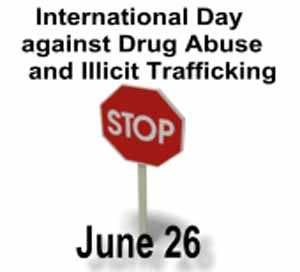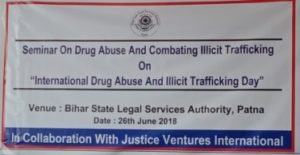While listening to the youth and children is an important step towards ensuring they stay away from substance abuse, changing lifestyles, increasing isolation due to social media and cell phones, as well as hastily imposed prohibition are among the reasons of an increased intake of narcotics by teenagers in Bihar. Legislation and laws also have an important part to play in the prevention and control of drug abuse.
A seminar on Drug Abuse and Combating Illicit Trafficking was jointly organized by the Justice Ventures International and Bihar State Legal Service Authority (SLSA) at SLAS office, on 26th June the International Day against drug abuse and illicit trafficking. The objective of the seminar was to create awareness and to discuss the reasons why people get addicted to drugs and what can be the solutions.
The seminar was addressed by Sunil Dutt Mishra (member secretary of SLSA), R.N.S Pandey (joint secretary of SLSA), Sumit Ranjan (assistant registrars SLSA), Deepak Kumar (director of Disha De-Addiction-cum-Rehabilitation centre) and Frank Krishner (Journalist and Social Activist), Rajan Shah (Justice venture India) and Manohar Manav (Bandhua Mukti Yojana).
Mr. Sunil Dutt Mishra said that the main objective of the event was to look at the issue from several viewpoints and angles and to discuss ways to build an awareness that drug or any kind of substance abuse is not only harmful for their health but for society too. He said “People are aware that substance or liquor abuse is harmful to them but still they are taking drugs so we need to sensitize them so that they can realize that it is wrong. Laws can stop the trade but not people from consuming it. The main focus should be that they themselves remove liquor and drugs from their lives.”
Parental Control?
Joint secretary of SLSA, R.N.S Pandey spoke on the theme of UN for The world Anti-Drug Day “Listen First” and mentioned that parents have the most important role in their children’s lives. “They need to maintain a friendly relationship with their children so that they know their child’s thoughts and feelings. On the other hand, he observed that the urban living system, in which everybody minds their own business, has removed the social control upon children by the neighbours, family friends and teachers in the older ‘neighbourhood style of life’ of the 60’s and 70’s. In towns and cities, nobody will care to give unwanted advice to a young kid seen smoking or hanging around a liquor shop”.
Face the facts, prohibition led to increase in drug abuse
In his presentation on the state of substance abuse among children and youth in Bihar, Newsnet Editor and AASRA Communications coordinator Frank Krishner pointed out that all human beings want to escape frustrations, problems, tensions, depression and pain, not just youth or young people. Drawing on his decades of experience working with HIV positive people and street children, he said that what impels children towards the consumption of intoxicants and substance abuse are isolation, pleasure, escapism and peer pressure. Quoting from several media reports and diverse opinions, he pointed out that there has in fact been a 700 per cent increase in the sale of narcotics in Bihar. Even an organisation such has Disha has been quoted in the media as admitting that they have seen a rise in substance abusers in their clinics after the total prohibition was introduced in Bihar.
Straight talking
Drawing the line between ‘use’ and ‘abuse’, he said that when the government has banned the use of as mild a drink as lager beer, with less than 5 percent alcohol, it was no great surprise that youngsters would turn to other sources of ‘liberation’ from their perceived pain. Nobody can contest the fact that beer is far less addictive and counterproductive than hashish, smack, or cocaine! Even before prohibition, street children and youth have had access to a variety of intoxicant and illicit substances, from Marijuana, cough syrup and prescription pain killers to whiteners (correction fluids), kerosene oil and petrol. Peer group pressure didn’t come yesterday, all of us have had to deal with it, he said. “Really listening to the children, observing their behaviour, and educating parents on the symptoms of substance abuse are very important to keep substance abuse in check” he added.
Support, Don’t Punish
While acknowledging that the complete liquor ban has increased the drugs abuse rate in Bihar, the JVI director said that while prohibition of liquor in Bihar has had great social benefits, the Bihar government needs to review the laws and look for humane solutions, especially because there are thousands of poor people languishing in jail. Deepak Kumar (Director of Disha) who came out rather strongly in support of total prohibition, using emotional imagery, and quoting from Gandhi, said that Addicts need to be treated as patients, since addiction is a sickness. There should be drug rehabilitation facilities provided by the government. Drug traffickers were the law-breakers, the addicts had become their victims. Therefore the laws should be made humane. Addicts need support to kick the habit and regain their place in society, not punishment and shaming.
A scheme for eradicating drugs and special cells for drug addicts by National Legal Service authority (NLSA) was also announced by the joint secretary of SLSA.
Written by the Newsnet Desk with inputs from Priyanka, Newsnet Intern

